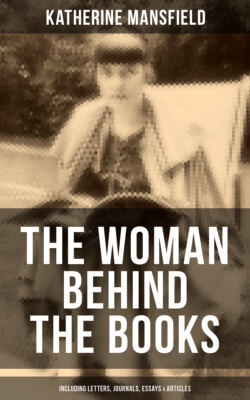Читать книгу Katherine Mansfield, The Woman Behind The Books (Including Letters, Journals, Essays & Articles) - Katherine Mansfield - Страница 33
На сайте Литреса книга снята с продажи.
3
ОглавлениеIn their short holidays the children followed the little scalloped bays along the shore to Island Bay. Island Bay was just a suburb of Wellington around the point toward Happy Valley. It was all inlets and rocky caves; a wild man lived in one of them (so they said). He made the expedition uncertain and daring; but unlike Old Underwood, he hid himself well away and so was rarely cornered. Long afterward, Kathleen wrote to Mr. Ruddick:
“Does Marion remember Island Bay, I wonder, and bathing her doll in the rock pools with me? … I wonder if she has forgotten our games at Miss Partridge’s, or old Miss Partridge’s way of saying: ‘Oh, I’m so tired!’ Or the cream buns we were given for tea. I must say I think the cream buns should have been withheld from me, though.”
The girls learned to swim and dive, in those days, at the Thorndon Sea Baths, below the Quay, where they were taken three times a week. For years they remembered the seaweedy odour, the gritty marmalade sandwiches which they devoured afterward, and the lemonade they drank while the elders drank tea.
There were games: tennis on the hard court at No. 75; and, while they lived there — billiards.
“… Billiards…. It’s a fascinating game. I remember learning to hold a cue at Sir Joseph Ward’s, and I can see now R.’s super refinement as if she expected each ball to be stamped with a coronet before she would deign to hit it.”
There were a few parties, usually for tea, but an occasional one in the evening when they were “invited out,” and brought “slippers in a satin bag.” Sometimes there were dances of the kind authorised then:
“Somewhere quite near someone is playing very old-fashioned dance tunes on a cheap piano, things like the Lancers, you know. Some minute part of me not only dances to them but goes faithfully through Ladies in the Centre, Visiting, Set to Corners, and I can even feel the sensation of clasping warm young hands in white silk gloves, and shrinking from Maggie Owen’s hand in Ladies’ Chain because she wore no gloves at all.”
After they had moved back to town, Mr. Beauchamp bought the country place at Day’s Bay, near Mirimar, for the children’s long holidays.
There was no road around the edge of the Harbour then; the only way to reach the Bay was by The Duke or The Duchess, sailing across Lambton Harbour. Often the girls held each other’s heads for that rough half hour. Day’s Bay was a quiet place, a paradise for children. Zoe was at a cottage near the Beauchamps’ and the Walter Nathans were not far away; but except for a pavilion occasionally open for entertainment, these few families had the Bay to themselves. Kass and Marion spent their December summer holidays there. To the Canadian child, this semi-tropical life was filled with surprise :
“When we weren’t paddling in the sea, we were digging sand castles with marvellous moats and draw- bridges. Zoe initiated us into the joys of shrimping in the rock pools; and we loved seeing shrimps back, in their silly way, into the nets. We thought it cruel to have them plunged into boiling water alive, but the assurance that they were killed instantly, and the lovely salmony pink colour they turned to from a dull greenish grey, compensated us for the boiling process. From delving in the rock pools, we evolved the idea of rock pool gardens; each selecting a pool, we collected seaweed, pearly shells, coloured stones, sea anemones and star fish. I vaguely remember Christmas at the Bay. I gave Kass a thimble in a green plush case, and felt at the time that she would have much preferred a book. To Jeanne I gave a pink and white dolls’ teapot, which she still talks about. ‘Chummie’ had a toy dancing bear, and that is all I remember except a present that I received of a large mauve box of chocolate almonds with a pair of gilt tongs on top. It was my first real box of sweets — from a friend of my father — and Kass and I were both quite overcome by such magnificence.”
The quietness of Day’s Bay became, for Katherine Mansfield, a standard of stillness. It was only of the heightened sense of absolute stillness produced by isolation and illness and “a sky like lead” that she could say it was “much quieter than Day’s Bay.” That meant a superhuman, or even an inhuman stillness — the quietness that descends upon one who has drifted out of life itself. The quietness of Day’s Bay represented a perfection of human stillness, friendly and benign. It was of Day’s Bay and her summers there that she was thinking when, in a mood of happiness in a Paris spring, — when, as she walked,”the air just lifts enough to blow on your cheeks. Ah, how delicious that is!” — she tried to make a present of her happiness to a friend.
“There is a wharf not far from here where the sand barges unload. Do you know the smell of wet sand? Does it make you think of going down to the beach in the evening light after a rainy day and gathering the damp driftwood (it will dry on the top of the stove) and picking up for a moment the long branches of seaweed that the waves have tossed and listening to gulls who stand reflected in the gleaming sand, and just fly a little way off as you come and then — settle again?”
